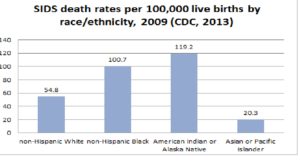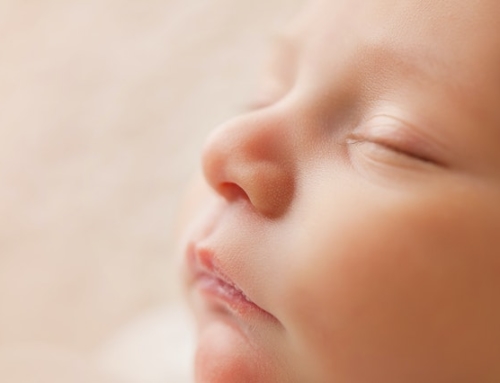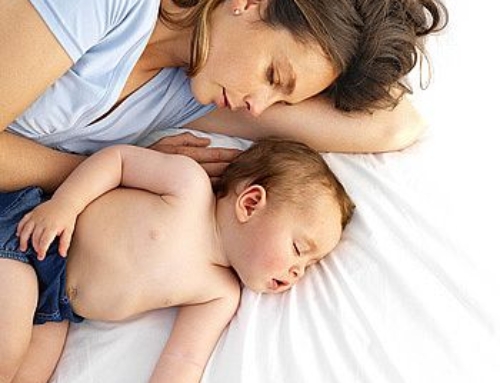 For years now, we – those of us in Western, capitalist countries – have been bombarded with messages about how dangerous bedsharing is. We get images of babies sleeping with knives or headboards as gravestones to remind us that bedsharing is the worst thing you can do.
For years now, we – those of us in Western, capitalist countries – have been bombarded with messages about how dangerous bedsharing is. We get images of babies sleeping with knives or headboards as gravestones to remind us that bedsharing is the worst thing you can do.
It’s convenient as it places the burden of a baby’s death squarely on the shoulders of the parents. And in cultures that promote such independence, that shouldn’t be too surprising. After all, in the United States, for example, self-determination is one of the cornerstones for everyone. It doesn’t matter your origin, you are supposed to be able to make it on your own. (Let’s just ignore that the vast majority of people that “make” it have pre-existing privilege that they don’t want to talk about.)
The problem is that this is so simplistic and, as new research suggests, quite possibly very wrong.
Drs. Melissa Bartick and Cecilia Tomori co-author a new study that examined pre-existing data on SIDS and SUID for what is deemed “syndemics”[1]. What is this? It is when two or more epidemics interact synergistically to contribute to the prevalence of or increase the risk for a disease or outcome in a specific population, in this case SUID. Specifically, syndemic theory treats disease not in isolation, but as part of the culture and social conditions of the groups affected. Let us look at the case of SUID and SIDS to better understand what is happening…
Now, before we include bedsharing in this, let’s first acknowledge that the risk for bedsharing is actually quite debatable and there is a fair bit amount of research that suggests bedsharing is either not a factor when done intentionally[2], is not a factor when missing other risk factors (like the aforementioned)[3], is protective past 4 months of age[4], and is intricately related with breastfeeding which is protective of SUID and SIDS, which poses some issues when trying to look at normal parental behaviours[5]. Good, with that said, let’s look at how bedsharing factors into the above.
The bedsharing part comes in here because many of these disadvantaged groups do bedshare on a regular basis. Why the authors are able to tease this apart is that so do many groups with some of the lowest SUID and SIDS rates. It’s the other factors that have changed. For example, Sweden had the highest rate of bedsharing in their review of all Western countries, but also had one of the lowest rates of SUID. They also, of course, have high breastfeeding rates, universal health care (which equals good prenatal care), parental leave, and low smoking rates. In this environment, bedsharing is not a factor for SUID or SIDS.
 Contrast this to the Black population in the United States where bedsharing is also more prevalent than for non-Hispanic White populations, but in line with the Asian/Pacific Islander US population. Blacks have a SUID rate of 1.88 per 1000 live births compared to 0.90 in the US White population and 0.41 in the US Asian/Pacific Islander population. Although bedsharing does increase compared to Whites, it is no different than that of the US Asian/Pacific Islander population, but what is different are the rates of other key variables, smoking, alcohol intake, lack of prenatal care, higher rates of preterm birth, and lower rates of breastfeeding. If you then factor in the effects of stress from ongoing systemic racism and historical trauma (which has been studied and isn’t just some made-up thing, check out [6][7][8]), you have a perfect storm for an increased risk of something like SUID or SIDS.
Contrast this to the Black population in the United States where bedsharing is also more prevalent than for non-Hispanic White populations, but in line with the Asian/Pacific Islander US population. Blacks have a SUID rate of 1.88 per 1000 live births compared to 0.90 in the US White population and 0.41 in the US Asian/Pacific Islander population. Although bedsharing does increase compared to Whites, it is no different than that of the US Asian/Pacific Islander population, but what is different are the rates of other key variables, smoking, alcohol intake, lack of prenatal care, higher rates of preterm birth, and lower rates of breastfeeding. If you then factor in the effects of stress from ongoing systemic racism and historical trauma (which has been studied and isn’t just some made-up thing, check out [6][7][8]), you have a perfect storm for an increased risk of something like SUID or SIDS.
I’ve shared two examples, but their paper is a look at much more than this and is critical for all to read and acknowledge if we are going to try to alleviate the burden and trauma of SUID and SIDS. Drs. Bartick and Tomori acknowledge that there is still much to learn as understanding the relationships between these areas is still gray, but we have to start moving on removing these systemic barriers to healthy babies, as they aptly point out, not just for babies, but for the well-being of our society.
It may all sound quite simple – of course poverty, SES, historical trauma and everything associated with these factors influences infant mortality of all kinds! – but it’s actually quite difficult. It forces us in Western cultures with a strong belief in self-determination to step back and acknowledge our own personal limitations in helping save our babies. Bedsharing is an easy scapegoat that gets to place the burden on families, but it’s one that just doesn’t hold under closer scrutiny. Unfortunately in life things are rarely so simple and even more unfortunately, we are at the whim of the cultural structures we inherit at birth and their impact on our lives. We have to accept – much to our chagrin – that we need others to help us keep our babies alive (and so much more).
What this means for us as individuals is that we all have a role to play in reducing SUID and SIDS, but not by berating families not to bedshare, but by doing all we can to create a society that supports everyone. The problem some of us can have now is how we as individuals tackle what is now a systemic problem. Here are some ideas:
- Join movements in your area that focus on the issues facing marginalized and minority groups, even if you are in the majority. Just be prepared to listen to them on what they need from you and others and be prepared to act.
- Speak out against injustice when you see it. Passivity is simply unspoken support.
- Join your local LLL and focus on their work to expand breastfeeding support to marginalized and poorer communities.
- Donate to non-profits that work to provide prenatal care to those who do not have access or, if you are a medical professional, join one of these non-profits and provide some medical care to those in need.
- Advocate to your government for the following:
- Increases in cost of tobacco (which is a strategy to help reduce tobacco use)
- Improve parental leave policies
- Expand any government-sponsored health coverage to include pregnant women and their babies
- Find affordable and safe housing for pregnant women and young families
- Ask a friend who is a part of a marginalized group what you can do specifically to support them as they welcome a new baby. They may not have a social safety net, but if they have one of friends, that can make a large difference as well.
I don’t believe this will be a quick fix, but I can guarantee that no matter where you live, a lot more could be done and you can – and should – be a part of it.
___________________________________
[1] Bartick, M. & Tomori C. (2018.) Sudden infant death and social justice: a syndemics approach. Maternal & Child Nutrition. https://doi.org/10.1111/mcn.12652 [2] Vennemann, M. M., Bajanowski, T., Brinkmann, B., Jorch, G., Yucesan, K., Sauerland, C., & Mitchell, E. A. (2009). Does breastfeeding reduce the risk of sudden infant death syndrome? Pediatrics, 123(3), e406–e410. https://doi.org/10.1542/peds.2008‐2145 [3] Blair, P. S., Sidebotham, P., Pease, A., & Fleming, P. J. (2014). Bed‐sharing in the absence of hazardous circumstances: Is there a risk of sudden infant death syndrome? An analysis from two case–control studies conducted in the UK. PLoS One, 9(9), e107799. https://doi.org/10.1371/journal.pone.0107799 [4] Colvin, J. D., Collie-Akers, V., Schunn, C., & Moon, R. Y. (2014). Sleep environment risks for younger and older infants. Pediatrics, 134(2), e406-e412. https://doi.org/10.1542/peds.2014-0401. [5] Ball, H. L., Howel, D., Bryant, A., Best, E., Russell, C., & Ward‐Platt, M. (2016). Bed‐sharing by breastfeeding mothers: Who bed‐shares and what is the relationship with breastfeeding duration? Acta Paediatrica, 105(6), 628–634. https://doi.org/10.1111/apa.13354 [6] Geronimus, A. T. (1992). The weathering hypothesis and the health of African‐American women and infants: Evidence and speculations. Ethnicity & Disease, 2(3), 207–221. [7] Dresslers, W. W., Oths, K. S., & Gravlee, C. C. (2005). Race and ethnicity in public health research: Models to explain health disparities. Annual Review of Anthropology, 34, 231–252. [8] Commission on Social Determinants of Health, & World Health Organization (2008). Closing the gap in a generation: Health equity through action on the social determinants of health. Geneva[/fusion_builder_column][/fusion_builder_row][/fusion_builder_container]





thank you for this clear and compassionate article. anyone who truly wants to improve infant/child health and safety should be aware of the connections between these issues, and those of us who practice and teach attachment or natural parenting need such clarity to offer our clients and communities.
I totally agree with nofixedstars, it is so important these days that science backs up healthy practice. In general it’s doctors who provide the information for parents and it can be a big problem if this community is not informed properly by what science shows and what not. After all, health professionals are often not trained to understand science and depend on authorities to provide the information.
Thank you for the work you’re doing! :))
[…] Source: https://gku.flm.mybluehost.me/evolutionaryparenting.com/suid-sids-and-poverty-leaving-bedsharing-out-of-the-debate/ […]